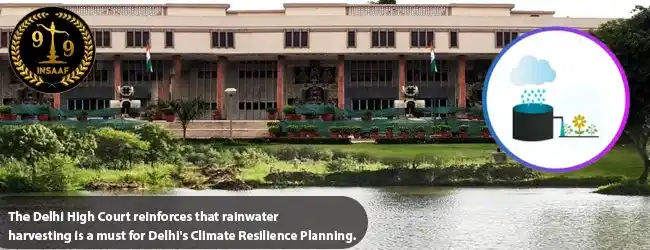2023-Aug-19

IN THE HIGH COURT OF DELHI AT NEW DELHI
Reserved on: 31 st July, 2023
Pronounced on: 18th August, 2023
R.K. KAPOOR ..... Petitioner
Through: Petitioner in person.
versus
NATIONAL CAPITAL TERRITORY OF DELHI & ORS ..... Respondents
Through: Ms. Hetu Arora Sethi, ASC with Ms
Saumya Tandon, Advocate for R-1.
Mr. Siddhant Nath and Mr. Akshay
Pratap, Advocates for DDA.
Mr. Ajay Vikram Singh, Advocate for
Delhi Jal Board.
Ms. Puja Kalra, Standing Counsel for
MCD/ NDMC.
Ms. Beenashaw Soni, Standing
Counsel with Ms. Mansi Jain and Ms.
Aun Joseph, Advocates for SDMC.
CORAM:
HON'BLE THE CHIEF JUSTICE
HON'BLE MR. JUSTICE SANJEEV NARULA.
J U D G M E N T
SANJEEV NARULA, J.
1. The current Public Interest Litigation (PIL) revolves around the pressing concern of water conservation in the National Capital Territory (NCT) of Delhi, specifically focusing on implementation of rainwater harvesting initiatives. The petition outlines a series of remedies aimed at fostering a comprehensive approach to address the issue of rainwater harvesting.
2. The Petitioner asserts that Delhi experiences an average annual rainfall of approximately 611 mm, with a significant 80% of this precipitation occurring within a short span of three months (July to September). The city encounters only 20 to 30 days of substantial rainfall – each involving more than or equal to 2.5 mm of rainfall. Given this limited and erratic rainfall pattern, there arises a critical need to institute water conservation measures, pertinently, rainwater harvesting, to replenish the depleting natural aquifers. Rapid urbanization and a burgeoning population have led to the accelerated exhaustion of Delhi's existing water reservoirs. As far back as 2000, the city faced a demand for 3,324 million litres of water per day (MLD), while only an estimated 2,034 MLD was available. Today, this demand-supply gap has exponentially widened, underscoring the urgency of the situation. This widening gap has spurred the extensive extraction of groundwater, further compounding the water crisis.
3. The Petitioner further contends that Delhi relies on three primary sources of water: (i) surface water, including the Yamuna river, Ganga canal, and Bhakra canal, with 60% of the supply originating from the Yamuna river; (ii) sub-surface water, drawn from wells and tube wells, which is replenished by rainfall; and (iii) groundwater reserves. The data alarmingly reveals that the rate of ground water withdrawals currently outpaces the rate of natural replenishment in various parts of the city. The Petitioner relies on a report by the Central Ground Water Board (CGWB) which highlights that Delhi's groundwater levels have plummeted by 8 meters over the last two decades, descending at an average rate of 10 feet per year. Equally concerning is the deteriorating quality of groundwater, rendering it unsuitable for human consumption in several Delhi localities. Adding to these woes, unequal distribution of water resources across different areas is exacerbated by deficient sewage systems and clogged drains that obstruct the natural restoration of the water table.
What can the Legal Experts do for you? Our team of lawyers is ready to help you in minutes with any legal question.
 Whatsapp
Whatsapp
 Toll Free :-
1800-212-9001
Toll Free :-
1800-212-9001